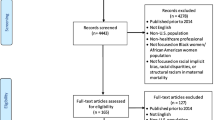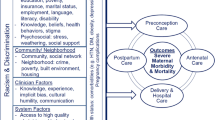Abstract
We examined the birth experience of immigrant and minority women and how CenteringPregnancy (Centering), a model of group prenatal care and childbirth education, influenced that experience. In-depth interviews and surveys were conducted with a sample of racially diverse Centering participants about their birth experiences. Interview transcripts were analyzed thematically. Study participants (n = 34) were primarily low-income, Spanish-speaking immigrants with an average age of 29.7. On a scale from 1 (not satisfied) to 10 (very satisfied), women reported high satisfaction with birth (9.0) and care (9.3). In interviews, they expressed appreciation for the choice to labor with minimal medical intervention. Difficulties with communication arose from fragmented labor and delivery care by multiple providers. Centering provided women with pain coping skills, a familiar birth attendant, and knowledge to advocate for themselves. High reported satisfaction may obscure challenges to providing high quality childbirth care for marginalized women. Further study should examine the potential of Centering to positively impact underserved women’s birth experiences.
Similar content being viewed by others
References
Sorenson DS, Tschetter L. Prevalence of negative birth perception, disaffirmation, perinatal trauma symptoms, and depression among postpartum women. Perspect Psychiatr Care. 2010;46(1):14–25. doi:10.1111/j.1744-6163.2009.00234.x.
Waldenstrom U, Hildingsson I, Rubertsson C, Radestad I. A negative birth experience: prevalence and risk factors in a national sample. Birth. 2004;31(1):17–27. doi:10.1111/j.0730-7659.2004.0270.x.
Rijnders M, Baston H, Schönbeck Y, et al. Perinatal factors related to negative or positive recall of birth experience in women 3 years postpartum in the Netherlands. Birth. 2008;35(2):107–16. doi:10.1111/j.1523-536X.2008.00223.x.
Bell AF, Carter CS, Davis JM, et al. Childbirth and symptoms of postpartum depression and anxiety: a prospective birth cohort study. Arch Womens Ment Health. 2015;. doi:10.1007/s00737-015-0555-7.
McCourt C, Weaver J, Statham H, Beake S, Gamble J, Creedy DK. Elective cesarean section and decision making: a critical review of the literature. Birth. 2007;34(1):65–79. doi:10.1111/j.1523-536X.2006.00147.x.
Latva R, Korja R, Salmelin RK, Lehtonen L, Tamminen T. How is maternal recollection of the birth experience related to the behavioral and emotional outcome of preterm infants? Early Hum Dev. 2008;84(9):587–94. doi:10.1016/j.earlhumdev.2008.02.002.
Elvander C, Cnattingius S, Kjerulff KH. Birth experience in women with low, intermediate or high levels of fear: findings from the first baby study. Birth. 2013;40(4):289–96. doi:10.1111/birt.12065.
Nystedt A, Högberg U, Lundman B. The negative birth experience of prolonged labour: a case-referent study. J Clin Nurs. 2005;14(5):579–86. doi:10.1111/j.1365-2702.2004.01105.x.
Stadlmayr DMW, Amsler F, Lemola S, et al. Memory of childbirth in the second year: the long-term effect of a negative birth experience and its modulation by the perceived intranatal relationship with caregivers. J Psychosom Obstet Gynecol. 2015. http://www.tandfonline.com/doi/abs/10.1080/01674820600804276#.VdyqtkX_LC0. Accessed 25 August 2015.
Haines HM, Rubertsson C, Pallant JF, Hildingsson I. The influence of women’s fear, attitudes and beliefs of childbirth on mode and experience of birth. BMC Pregnancy Childbirth. 2012;12(1):55. doi:10.1186/1471-2393-12-55.
Larsson C, Saltvedt S, Edman G, Wiklund I, Andolf E. Factors independently related to a negative birth experience in first-time mothers. Sex Reprod Healthcare. 2011;2(2):83–9. doi:10.1016/j.srhc.2010.11.003.
Child Health USA. Rockville, MD; 2013. http://www.mchb.hrsa.gov/.
Krans EE, Davis MM, Palladino CL. Disparate patterns of prenatal care utilization stratified by medical and psychosocial risk. Matern Child Health J. 2013;17(4):639–45. doi:10.1007/s10995-012-1040-9.
Almeida LM, Caldas J, Ayres-de-Campos D, Salcedo-Barrientos D, Dias S. Maternal healthcare in migrants: a systematic review. Matern Child Health J. 2013;17(8):1346–54. doi:10.1007/s10995-012-1149-x.
Boerleider AW, Wiegers TA, Manniën J, Francke AL, Devillé WLJM. Factors affecting the use of prenatal care by non-western women in industrialized western countries: a systematic review. BMC Pregnancy Childbirth. 2013;13(1):81. doi:10.1186/1471-2393-13-81.
Heaman M, Bayrampour H, Kingston D, et al. Migrant women’s utilization of prenatal care: a systematic review. Matern Child Health J. 2013;17(5):816–36. doi:10.1007/s10995-012-1058-z.
Korinek K, Smith KR. Prenatal care among immigrant and racial-ethnic minority women in a new immigrant destination: exploring the impact of immigrant legal status. Soc Sci Med. 2011;72(10):1695–703. doi:10.1016/j.socscimed.2011.02.046.
Rising S. Centering pregnancy an interdisciplinary model of empowerment. J Nurs Midwifery. 1998;43(1):46–54. doi:10.1016/S0091-2182(97)00117-1.
Rising SS, Kennedy HP, Klima CS. Redesigning prenatal care through CenteringPregnancy. J Midwifery Women’s Health. 2004;49(5):398–404. doi:10.1111/j.1542-2011.2004.tb04433.x.
Manant A, Dodgson JE. CenteringPregnancy: an integrative literature review. J Midwifery Womens Health. 2011;56(2):94–102. doi:10.1111/j.1542-2011.2010.00021.x.
Lathrop B. A systematic review comparing group prenatal care to traditional prenatal care. Nurs Womens Health. 2013;17(2):118–30. doi:10.1111/1751-486X.12020.
Robertson B, Aycock DM, Darnell LA. Comparison of centering pregnancy to traditional care in Hispanic mothers. Matern Child Health J. 2009;13(3):407-414. http://www.ncbi.nlm.nih.gov/entrez/query.fcgi?cmd=Retrieve&db=PubMed&dopt=Citation&list_uids=18465216.
Tandon SD, Cluxton-Keller F, Colon L, Vega P, Alonso A. Improved adequacy of prenatal care and healthcare utilization among low-income Latinas receiving group prenatal care. J Womens Health (Larchmt). 2013;22(12):1056–61. doi:10.1089/jwh.2013.4352.
Tandon SD, Colon L, Vega P, Murphy J, Alonso A. Birth outcomes associated with receipt of group prenatal care among low-income Hispanic women. J Midwifery Womens Health. 2012;57(5):476–81. doi:10.1111/j.1542-2011.2012.00184.x.
Trudnak TE, Arboleda E, Kirby RS, Perrin K. Outcomes of Latina women in CenteringPregnancy group prenatal care compared with individual prenatal care. J Midwifery Womens Health. 2013;58(4):396–403. doi:10.1111/jmwh.12000.
Hutchison MS, Ennis L, Shaw-Battista J, et al. Great minds don’t think alike: collaborative maternity care at San Francisco General Hospital. Obstet Gynecol. 2011;118(3):678–82. doi:10.1097/AOG.0b013e3182297d2d.
Smith JA, Flowers P, Larkin M. Interpretative phenomenological analysis: theory, method and research. Thousand Oaks: Sage Publications; 2009.
Larkin M, Watts S, Clifton E. Giving voice and making sense in interpretative phenomenological analysis. Qualitative Res Psychol. 2008. http://www.tandfonline.com/doi/abs/10.1191/1478088706qp062oa#.Vdy9JkX_LC0. Accessed 25 August 2015.
Dedoose Version 5.0.11, web application for managing, analyzing, and presenting qualitative and mixed method research data (2014). Los Angeles: SocioCultural research consultants, LLC (www.dedoose.com).
State and Country QuickFacts: San Francisco County, California. quickfacts.census.gov.
Declercq E, Sakala C, Corry MP, Applebaum S, Herrlich A. Listening to mothers III: pregnancy and birth.; 2013. http://childbirthconnection.org/article.asp?ck=10450. Accessed 7 May 2015.
Christiaens W, Bracke P. Assessment of social psychological determinants of satisfaction with childbirth in a cross-national perspective. BMC Pregnancy Childbirth. 2007;7(1):26. doi:10.1186/1471-2393-7-26.
Risisky D, Asghar SM, Chaffee M, DeGennaro N. Women’s perceptions using the CenteringPregnancy model of group prenatal care. J Perinat Educ. 2013;22(3):136–44. doi:10.1891/1058-1243.22.3.136.
Bender DE, Harbour C, Thorp J, Morris P. Tell me what you mean by “Si”: perceptions of quality of prenatal care among immigrant Latina women. Qualitative Health Res. 2001;11(6):780–94. doi:10.1177/104973230101100607.
Redshaw M. Women as consumers of maternity care: measuring “satisfaction” or “dissatisfaction”? Birth. 2008;35(1):73–6. doi:10.1111/j.1523-536X.2007.00215.x.
Acknowledgments
Support for the parent study was provided through a career award to the senior author from the National Center for Complementary and Integrative Health (NCCIH; K01 AT005270) and a grant from the Mount Zion Health Fund. Further NCCIH support for the current study was provided to the first and second authors (T32 AT003997, K01 AT006545). The funding sources had no role or involvement in the design and conduct of the study; the collection, management, analysis, or interpretation of the data; or in the preparation, review, or approval of the manuscript. Contents are solely the responsibility of the authors and do not necessarily represent the official views of the NIH, the Mount Zion Health Fund, or the San Francisco General Hospital, where the study was conducted. The authors thank Trilce Santana and Lisabeth Castro-Smyth for their work to recruit, enroll, and interview participants with the utmost care and respect. Gratitude is extended to the Homeless Prenatal Program, the SFGH Nurse-Midwives, and the Centering Healthcare Institute for their support of the broader study.
Author information
Authors and Affiliations
Corresponding author
Rights and permissions
About this article
Cite this article
Liu, R., Chao, M.T., Jostad-Laswell, A. et al. Does CenteringPregnancy Group Prenatal Care Affect the Birth Experience of Underserved Women? A Mixed Methods Analysis. J Immigrant Minority Health 19, 415–422 (2017). https://doi.org/10.1007/s10903-016-0371-9
Published:
Issue Date:
DOI: https://doi.org/10.1007/s10903-016-0371-9




